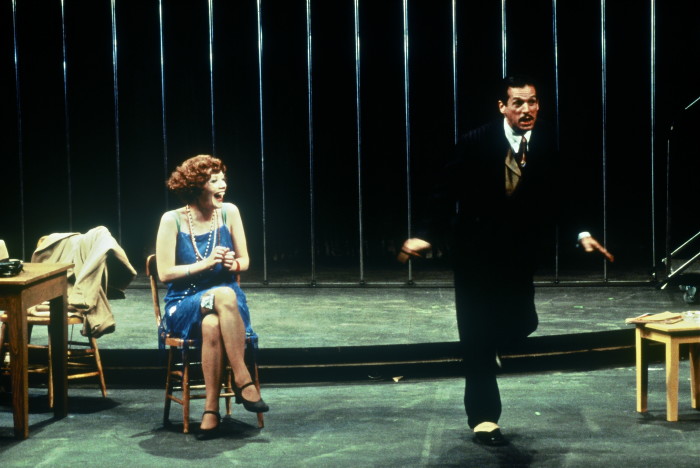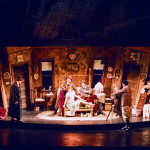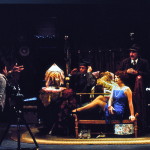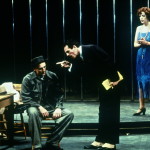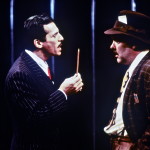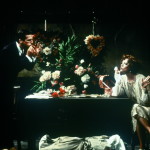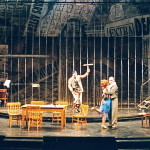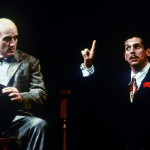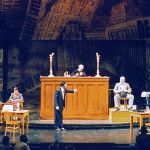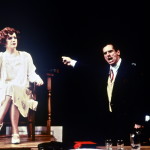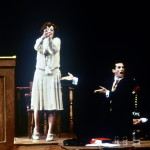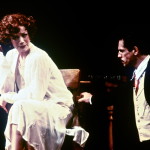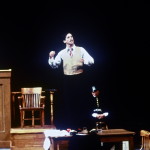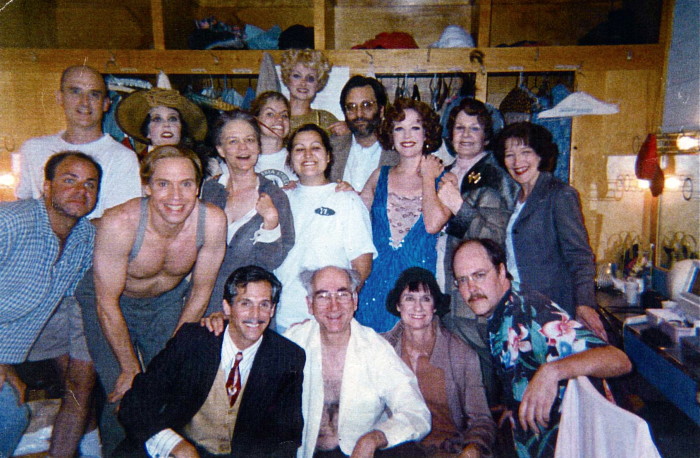Above, top to bottom: Linda Halaska and T. Ryder Smith; ensemble; David Weynand, Craig Wroe, Linda Halaska, and Richard Russell Ramos; Ray Dooley, T. Ryder Smith and Linda Halaska; T. Ryder Smith and Brad Bellamy; T. Ryder Smith and Linda Halaska; ensemble; ray Dooley and T. Ryder Smith; ensemble; Linda Halaska and T. Ryder Smith.
Excerpts from the reviews
“Director Martin Platt has given Maurine Watkins’ 1926 comedy ‘Chicago’ a splendid production . . . in the play’s first professional revival in 72 years. It looks and sounds marvelous, the acting is uniformly fine, and the production moves swiftly . . . The only flaw is a dated play . . . [but] the fun and quality of the production are reasons for seeing it. . . . The cast, without exception, is good. . . T. Ryder Smith’s Billy Flynn is a win-at-any-cost attorney whose body and facial gestures keep the dim Roxie on track and the audience [laughing]. . . . It would be difficult to find a better Roxie than Linda Halaska.” William MacNeill, The New Mexican
Offstage
Closing night: Back row: Ray Dooley, Joanna P. Adler, ?, Laura Metzger, Martin Platt,; middle row: David Weynand, Craig Rowe, Susanna Hay, ?, Linda Halaska, Virginia Hall-Smith, Susan Hoffer; kneeling: T. Ryder Smith, Richard Russsell Ramos, Alison Smith, Brad Bellamy.
Full reviews
Ann L. RyanThe Albuqurque Journal, Ann L. Ryan – ‘Chicago’ rolls at machine-gun pace. Yes, the name of one of the Santa Fe Stages shows now playing at the Greer Garson Theatre is “Chicago.”
No, it is not the musical. It’s the 1926 play by Maurine Watkins that inspired the musical. Watkins was a crime reporter for the Chicago Tribune during the Roaring ’20s — and they really roared in Chicago, home of Al Capone and location of the St. Valentine’s Day massacre.
Watkins covered a couple of spectacular trials involving women who killed their husbands, including Beaulah Annan, dubbed “the most beautiful murderess” Chicago had ever seen.
So while the play “Chicago” is farce, straight up, the inspiration was truth — one of these murderesses told Watkins, “Gin and guns, either one is bad enough, but together they get you in a dickens of a mess, don’t they?”
Here they get Roxie Hart (Linda Halaska) in a dickens of a mess. She shoots her lover (Alexander Ballas). Her husband Amos (Ray Dooley), not the brightest guy in the world, takes the fall, but not for long.
So Roxie goes to jail, where she meets up with other murderesses, including Velma (Joanna P. Adler), who shops at Marshall Field’s; Liz (Allison Smith), “God’s messenger” who screams a lot; Moonshine Maggie (Susan Hoffer), convicted of killing a customer with a bad batch of bathtub booze; and Machine-Gun Rosie (Melissa Hildebrand) and Go-to-Hell-Kitty (Laura Metzger), who both have lots of attitude.
The ward is run by Mrs. Morton (Suzanna Hay), a prison matron who really, really doesn’t like men.
Then there’s Billy Flynn (T. Ryder Smith), Roxie’s greedy and histrionic lawyer; Jake the reporter (Brad Bellamy), and Mary Sunshine (Virginia Hall-Smith), Chicago’s leading sob sister.
It’s a good cast, and they have a lot of fun with the material. It’s farce from start to finish — Do you really think Roxie is going to hang?
Director Martin L. Platt keeps everything moving very nicely, and, as usual, Russell Parkman’s set is as much fun as the show, and well-matched by Holly Poe Durbin’s luscious costumes.
There are good jokes, good pratfalls, more than a little tongue-in-cheek social commentary, but this is high-gloss theater — it’s all surface, no depth.
However, “Chicago” is a thoughtful choice to pair with Platt’s “A MacBeth,” a dazzlingly nihilistic production set during World War I, which runs through Sunday. It was the utter destruction of that war that lead in part to the utter corruption of the ’20s. That’s history: tragedy becomes farce. 7.22.1998
[previous] [next]
